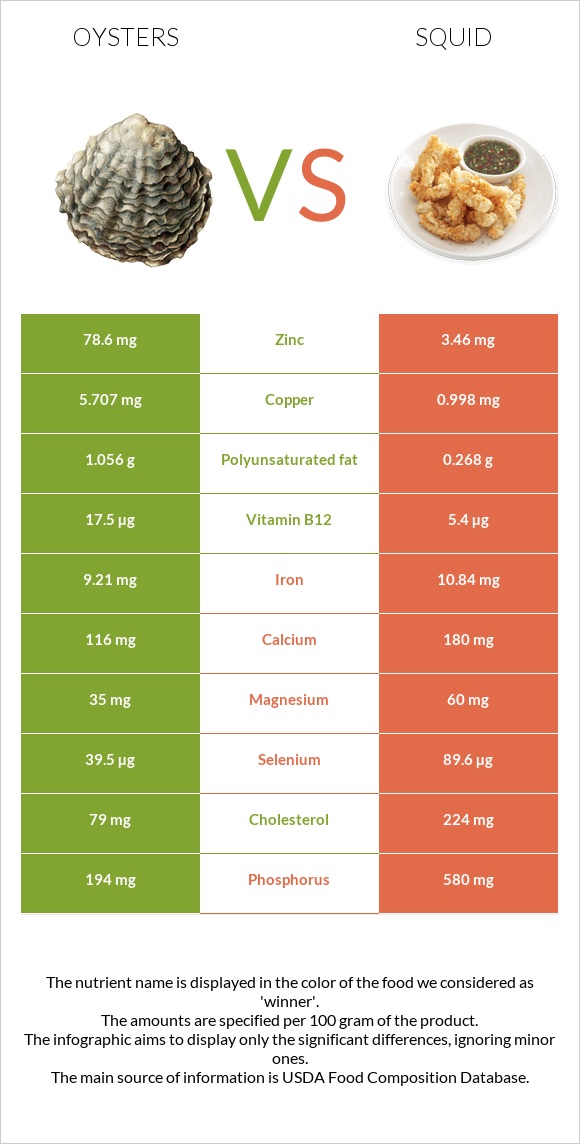Oysters vs. Squid — In-Depth Nutrition Comparison
Compare
How are oysters and squid different?
- Oysters has more zinc, copper, vitamin B12, and manganese; however, squid is richer in vitamin B2, selenium, phosphorus, and iron.
- Oysters covers your daily need for zinc, 683% more than squid.
- Oysters has 6 times more copper than squid. Oysters has 5.707mg of copper, while squid has 0.998mg.
- Oysters contains less cholesterol.
Mollusks, oyster, eastern, wild, cooked, moist heat and Mollusks, cuttlefish, mixed species, cooked, moist heat types were used in this article.
Infographic

Infographic link
Mineral Comparison
Mineral comparison score is based on the number of minerals by which one or the other food is richer. The "coverage" charts below show how much of the daily needs can be covered by 300 grams of the food.
| Contains more CopperCopper | +471.8% |
| Contains more ZincZinc | +2171.7% |
| Contains less SodiumSodium | -77.7% |
| Contains more ManganeseManganese | +182.8% |
| Contains more MagnesiumMagnesium | +71.4% |
| Contains more CalciumCalcium | +55.2% |
| Contains more PotassiumPotassium | +358.3% |
| Contains more IronIron | +17.7% |
| Contains more PhosphorusPhosphorus | +199% |
| Contains more SeleniumSelenium | +126.8% |
Vitamin Comparison
Vitamin comparison score is based on the number of vitamins by which one or the other food is richer. The "coverage" charts below show how much of the daily needs can be covered by 300 grams of the food.
| Contains more Vitamin EVitamin E | +∞% |
| Contains more Vitamin B1Vitamin B1 | +111.8% |
| Contains more Vitamin B12Vitamin B12 | +224.1% |
| Contains more Vitamin KVitamin K | +∞% |
| Contains more Vitamin CVitamin C | +∞% |
| Contains more Vitamin AVitamin A | +680.8% |
| Contains more Vitamin B2Vitamin B2 | +860.6% |
| Contains more Vitamin B3Vitamin B3 | +18.3% |
| Contains more Vitamin B5Vitamin B5 | +101.3% |
| Contains more Vitamin B6Vitamin B6 | +342.6% |
| Contains more FolateFolate | +71.4% |
All nutrients comparison - raw data values
| Nutrient |  |
 |
DV% diff. |
| Zinc | 78.6mg | 3.46mg | 683% |
| Copper | 5.707mg | 0.998mg | 523% |
| Vitamin B12 | 17.5µg | 5.4µg | 504% |
| Vitamin B2 | 0.18mg | 1.729mg | 119% |
| Selenium | 39.5µg | 89.6µg | 91% |
| Phosphorus | 194mg | 580mg | 55% |
| Cholesterol | 79mg | 224mg | 48% |
| Protein | 11.42g | 32.48g | 42% |
| Sodium | 166mg | 744mg | 25% |
| Choline | 130mg | 24% | |
| Iron | 9.21mg | 10.84mg | 20% |
| Vitamin A | 26µg | 203µg | 20% |
| Manganese | 0.591mg | 0.209mg | 17% |
| Vitamin B6 | 0.061mg | 0.27mg | 16% |
| Potassium | 139mg | 637mg | 15% |
| Vitamin E | 1.7mg | 11% | |
| Vitamin C | 0mg | 8.5mg | 9% |
| Vitamin B5 | 0.447mg | 0.9mg | 9% |
| Magnesium | 35mg | 60mg | 6% |
| Calcium | 116mg | 180mg | 6% |
| Polyunsaturated fat | 1.056g | 0.268g | 5% |
| Calories | 102kcal | 158kcal | 3% |
| Fats | 3.42g | 1.4g | 3% |
| Folate | 14µg | 24µg | 3% |
| Saturated fat | 0.948g | 0.236g | 3% |
| Vitamin B1 | 0.036mg | 0.017mg | 2% |
| Vitamin B3 | 1.85mg | 2.189mg | 2% |
| Vitamin K | 2µg | 2% | |
| Carbs | 5.45g | 1.64g | 1% |
| Monounsaturated fat | 0.506g | 0.162g | 1% |
| Net carbs | 5.45g | 1.64g | N/A |
| Vitamin D | 2 IU | 0% | |
| Sugar | 1.23g | N/A | |
| Starch | 0.9g | 0% | |
| Trans fat | 0.068g | N/A | |
| Tryptophan | 0.138mg | 0.364mg | 0% |
| Threonine | 0.046mg | 1.398mg | 0% |
| Isoleucine | 0.459mg | 1.414mg | 0% |
| Leucine | 0.716mg | 2.287mg | 0% |
| Lysine | 0.762mg | 2.427mg | 0% |
| Methionine | 0.257mg | 0.733mg | 0% |
| Phenylalanine | 0.413mg | 1.164mg | 0% |
| Valine | 0.523mg | 1.419mg | 0% |
| Histidine | 0.22mg | 0.624mg | 0% |
| Omega-3 - EPA | 0.353g | 0.078g | N/A |
| Omega-3 - DHA | 0.271g | 0.132g | N/A |
| Omega-3 - ALA | 0.163g | N/A | |
| Omega-3 - DPA | 0.02g | 0.012g | N/A |
| Omega-3 - Eicosatrienoic acid | 0.004g | N/A | |
| Omega-6 - Gamma-linoleic acid | 0.004g | N/A | |
| Omega-6 - Dihomo-gamma-linoleic acid | 0.007g | N/A | |
| Omega-6 - Eicosadienoic acid | 0.007g | N/A | |
| Omega-6 - Linoleic acid | 0.061g | N/A |
Macronutrient Comparison
Macronutrient breakdown side-by-side comparison
| Contains more FatsFats | +144.3% |
| Contains more CarbsCarbs | +232.3% |
| Contains more WaterWater | +27.9% |
| Contains more ProteinProtein | +184.4% |
| Contains more OtherOther | +121.1% |
Fat Type Comparison
Fat type breakdown side-by-side comparison
| Contains more Mono. FatMonounsaturated fat | +212.3% |
| Contains more Poly. FatPolyunsaturated fat | +294% |
| Contains less Sat. FatSaturated fat | -75.1% |





